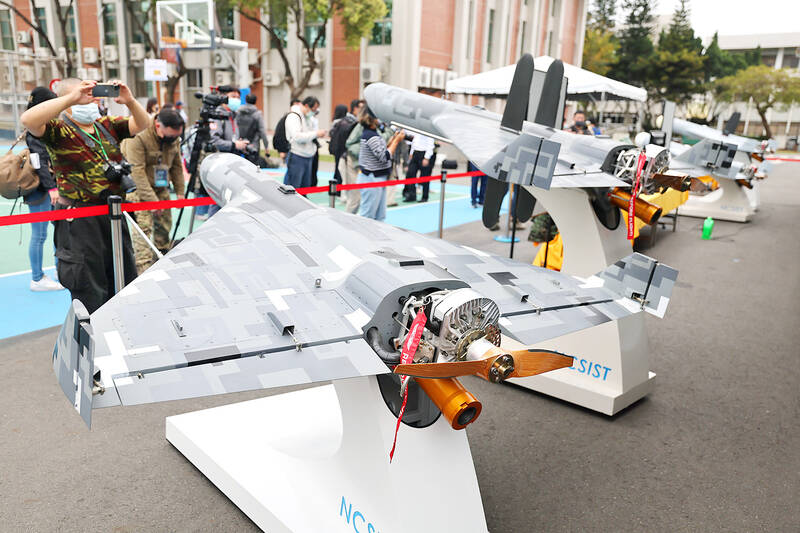Taiwan should seek opportunities to cooperate with the US on drone production, a Taiwanese researcher said yesterday, after the US Department of Commerce on Thursday announced a potential ban on drones with Chinese components.
The department said it was seeking to safeguard the supply chain for drones, as Russia and China could potentially access drones remotely and manipulate them to gain sensitive data, Reuters reported.
US Secretary of Commerce Gina Raimondo in September last year announced a similar ban on Chinese vehicles, it added.

Photo: CNA
“Taiwan should take this opportunity to clearly define the ‘non-red’ supply chain, and to become a trusted partner of the US in drone production,” Kuma Academy chief executive officer Ho Cheng-hui (何澄輝) said yesterday.
China and Russia have shown their intention to use cyberespionage to endanger US infrastructure and security, so Washington is likely to amend legislation to require private companies to cooperate on protecting national security, he said.
The geospatial information captured or collected by drones is highly sensitive and could have implications for national security. To address the issue, the US could take a phased approach, he said.
“To start with, it could clarify security concerns and require drone manufacturers to use databases and servers located in the US,” he said, adding that it could be strictly prohibited for drones to send any data back to China or be remotely accessible.
“Taiwan should also follow the US approach and implement inspection and control measures in stages,” Ho said.
Taiwan’s government already enforces measures for regulating drones in three stages starting from last year and would require registration measures for all drones on the market by the end of this year, he said.
“In the future, drones weighing more than 500g must undergo different tests related to information security, and manufacturers would be required to obtain registration certificates,” he said.
The Chungshan Institute of Science and Technology has also bolstered drone production in Taiwan through the establishment of an aerospace industrial park in Chiayi, which uses wind tunnels and artificial intelligence to aid development, he said.
“The park also facilitates customized site design, and there are facilities for hydrogen production and energy storage,” he said.
“The hope is to attract private enterprises to open in the park, with the aim of establishing a drone industry ecosystem,” he added.
While a full ban on Chinese drones for the commercial sector would be challenging, Taiwan must take steps to protect its domestic market and build a trustworthy supply chain to facilitate cooperation with the US and other partners, he said.

Chinese Nationalist Party (KMT) Chairman Eric Chu (朱立倫), spokeswoman Yang Chih-yu (楊智伃) and Legislator Hsieh Lung-chieh (謝龍介) would be summoned by police for questioning for leading an illegal assembly on Thursday evening last week, Minister of the Interior Liu Shyh-fang (劉世芳) said today. The three KMT officials led an assembly outside the Taipei City Prosecutors’ Office, a restricted area where public assembly is not allowed, protesting the questioning of several KMT staff and searches of KMT headquarters and offices in a recall petition forgery case. Chu, Yang and Hsieh are all suspected of contravening the Assembly and Parade Act (集會遊行法) by holding

PRAISE: Japanese visitor Takashi Kubota said the Taiwanese temple architecture images showcased in the AI Art Gallery were the most impressive displays he saw Taiwan does not have an official pavilion at the World Expo in Osaka, Japan, because of its diplomatic predicament, but the government-backed Tech World pavilion is drawing interest with its unique recreations of works by Taiwanese artists. The pavilion features an artificial intelligence (AI)-based art gallery showcasing works of famous Taiwanese artists from the Japanese colonial period using innovative technologies. Among its main simulated displays are Eastern gouache paintings by Chen Chin (陳進), Lin Yu-shan (林玉山) and Kuo Hsueh-hu (郭雪湖), who were the three young Taiwanese painters selected for the East Asian Painting exhibition in 1927. Gouache is a water-based

Taiwan would welcome the return of Honduras as a diplomatic ally if its next president decides to make such a move, Minister of Foreign Affairs Lin Chia-lung (林佳龍) said yesterday. “Of course, we would welcome Honduras if they want to restore diplomatic ties with Taiwan after their elections,” Lin said at a meeting of the legislature’s Foreign Affairs and National Defense Committee, when asked to comment on statements made by two of the three Honduran presidential candidates during the presidential campaign in the Central American country. Taiwan is paying close attention to the region as a whole in the wake of a

OFF-TARGET: More than 30,000 participants were expected to take part in the Games next month, but only 6,550 foreign and 19,400 Taiwanese athletes have registered Taipei city councilors yesterday blasted the organizers of next month’s World Masters Games over sudden timetable and venue changes, which they said have caused thousands of participants to back out of the international sporting event, among other organizational issues. They also cited visa delays and political interference by China as reasons many foreign athletes are requesting refunds for the event, to be held from May 17 to 30. Jointly organized by the Taipei and New Taipei City governments, the games have been rocked by numerous controversies since preparations began in 2020. Taipei City Councilor Lin Yen-feng (林延鳳) said yesterday that new measures by